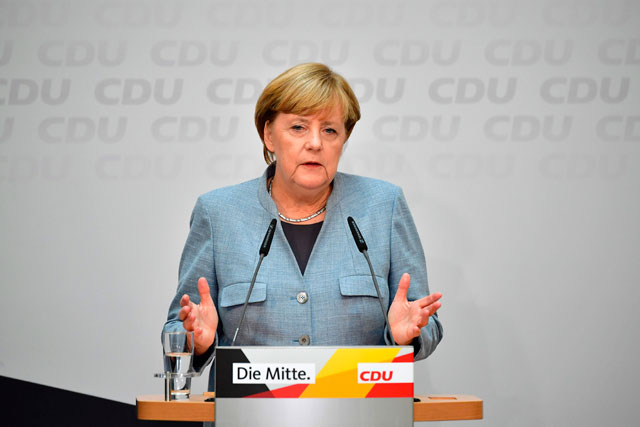BERLIN — Chancellor Angela Merkel said Monday she would talk with all mainstream parties about trying to form a “good, stable” government after Germany’s watershed election, and vowed to try to win back voters who supported an upstart nationalist force.
Sunday’s election saw the right-wing populist Alternative for Germany (AfD) Party poach 1 million votes from Merkel’s conservatives, leaving her without an obvious coalition to lead Europe’s largest economy.
“We had hoped for a better result,” she admitted, referring to her CDU/CSU bloc’s 33 per cent score, its worst outcome since 1949.
Merkel, 63, said she would now seek exploratory talks on an alliance with two smaller parties, the pro-business Free Democrats and the ecologist Greens.
And she said she would extend an olive branch to the Social Democrats, her junior partners for eight of her 12 years in power, who suffered a crushing 20.5 per cent share of the vote and pledged to go into opposition.
The poll marked a breakthrough for the anti-Islam AfD, which with 12.6 per cent became the third strongest party and vowed to “go after” Merkel over her migrant and refugee policy.
She admitted that she had been a “polarising figure” to many people who ultimately gave their vote to the AfD.
Merkel acknowledged that the AfD’s strongholds in depressed corners of the ex-communist east felt “left behind”.
She said she believed that not all were diehard supporters of the AfD and that at least some could be won back “with good policies that solve problems”.
News weekly Der Spiegel said Merkel had no one but herself to blame for her election bruising.
“Angela Merkel deserved this defeat,” the magazine’s Dirk Kurbjuweit wrote, accusing her of running an “uninspired” campaign and “largely ignoring the challenges posed by the right”.
‘Invasion of foreigners’
The entry of around 90 hard-right MPs to the glass-domed Bundestag chamber breaks a taboo in post-World War II Germany.
While joyful supporters of the AfD — a party with links to the far-right French National Front and Britain’s UKIP — sang the German national anthem at a Berlin club as the results came in late Sunday, hundreds of protesters outside shouted “Nazis out!”
The AfD’s top candidate in the election, Alexander Gauland, told reporters Monday that the party was the one true defender of a Germany for the Germans.
“I don’t want to lose Germany to an invasion of foreigners from foreign cultures,” he said.
He refused to back away from recent comments urging Germans to be proud of their war veterans, and calling for a government official who is of Turkish origin to be “dumped in Anatolia”.
But just hours after its triumph, the party’s long-simmering infighting between radical and more moderate forces spilled out into the open at a dramatic news conference.
AfD co-leader Frauke Petry stunned her colleagues by saying she would not join the party’s parliamentary group and would serve as an independent MP. She then abruptly left the room in a move Gauland criticised as “excessively feisty”.
Political scientist Suzanne Schuettemeyer of Halle University in eastern Germany said despite it remaining an opposition party with marked internal divisions, the AfD’s presence in parliament would harm the country’s image abroad.
“It’s Germany and it will change the way we are perceived, because AfD will speak a language that we thought... was outside of our political consensus,” she told AFP.
‘Bitter disappointment’
All other political parties have ruled out working with the AfD, whose leaders call Merkel a “traitor” for allowing in more than 1 million asylum seekers since 2015.
Merkel said Monday that while she was not seeking a repeat of the influx, she stood by her decision made on “humanitarian” grounds.
But the leader of her Bavarian CSU allies, Horst Seehofer, a vocal critic of Merkel’s asylum policy, called the poll outcome a “bitter disappointment” and vowed to close the “open flank” on the right before state elections next year.
The Social Democrats’ leader Martin Schulz, putting a brave face on his defeat, vowed Monday that the 150-year-old traditional workers’ party would be “a strong opposition force in this country, to defend democracy in this country against those who question it and attack it”.
This will likely force Merkel to team up with two smaller, and very different, parties to form a lineup dubbed the “Jamaica coalition” because the three parties’ colours match those of the Caribbean country’s flag.
One is the liberal Free Democratic Party (FDP), which scored a 10.7-per cent comeback after crashing out of parliament four years ago.
The other is the left-leaning Greens Party, which won 8.9 per cent on campaign pledges to drive forward the country’s clean energy transition.
But with marked differences on issues ranging from EU integration to immigration, months of horse-trading could lie ahead to build a new government and avert snap elections.
